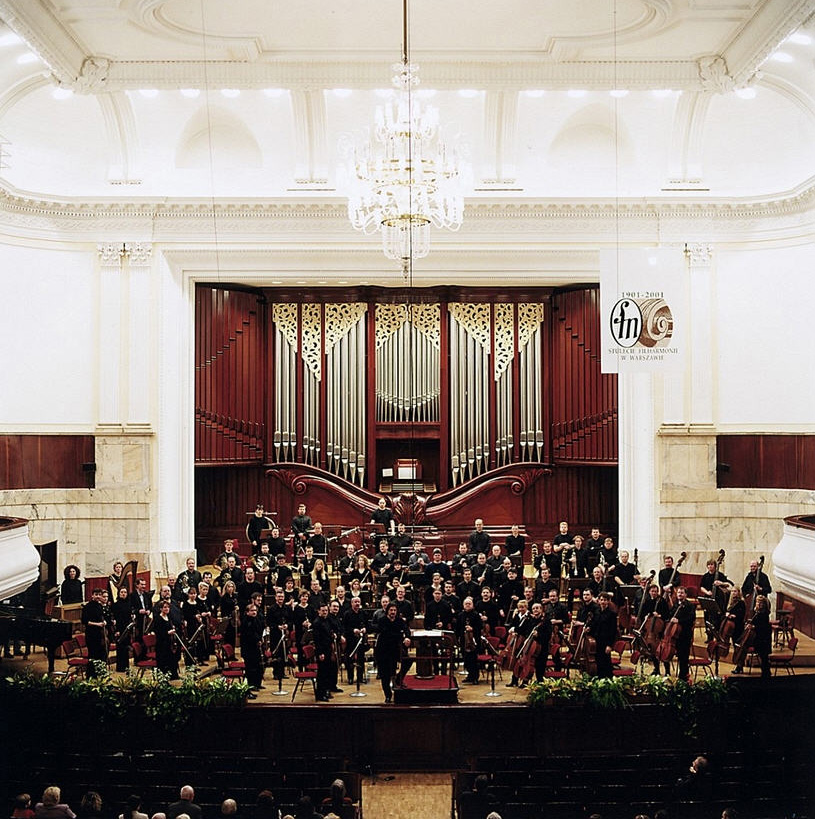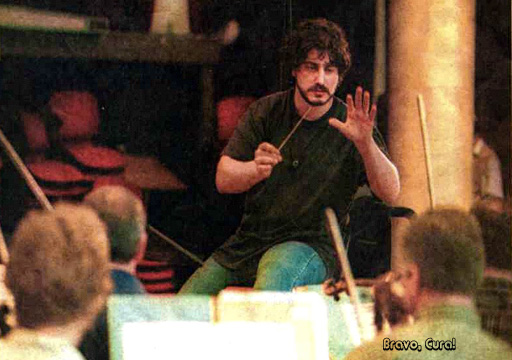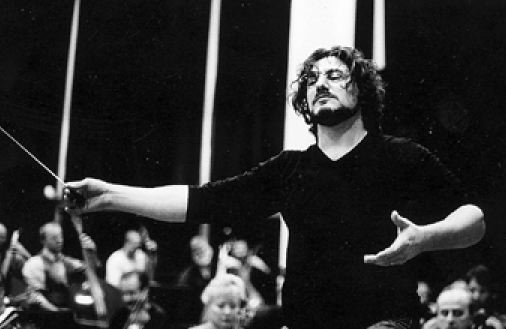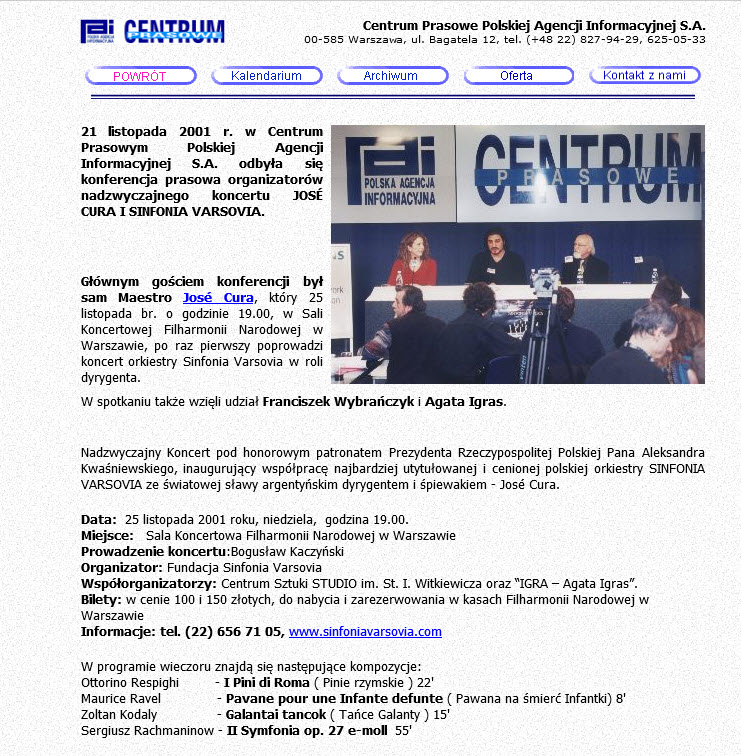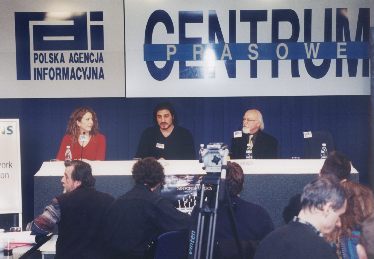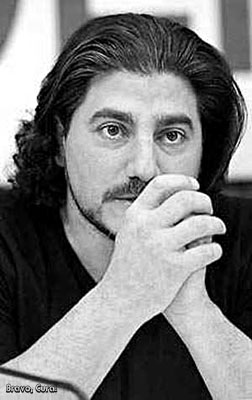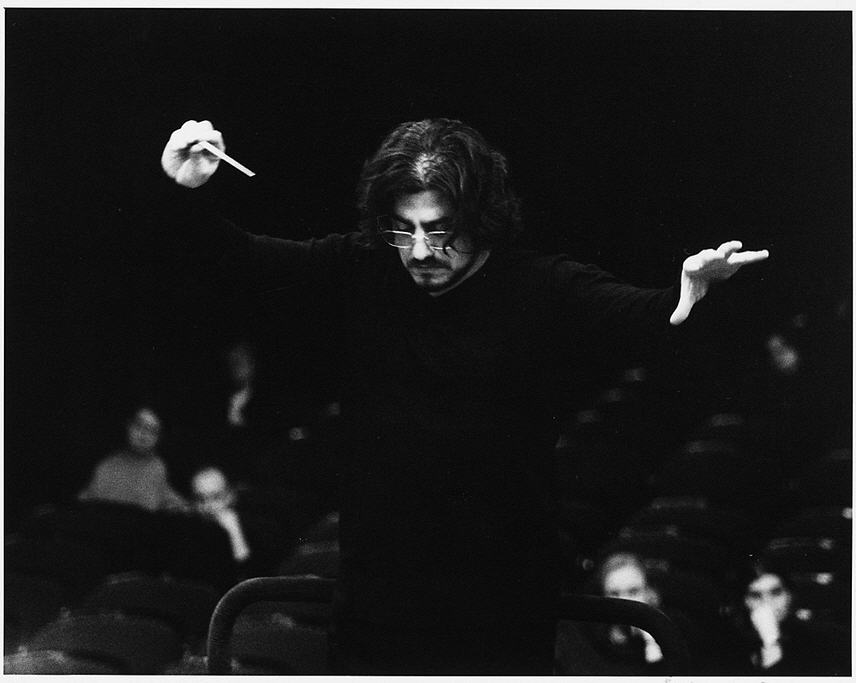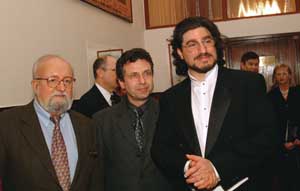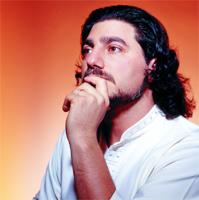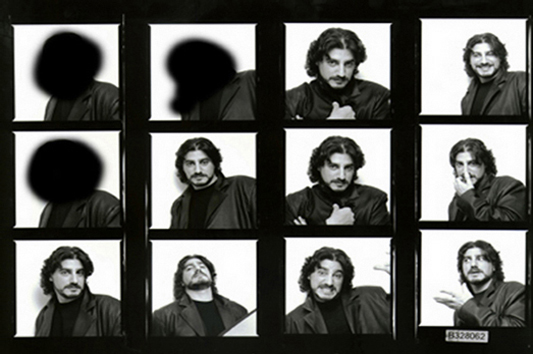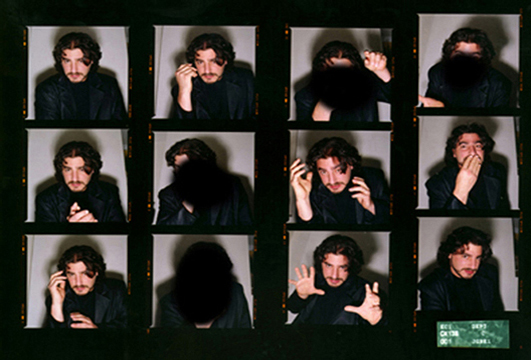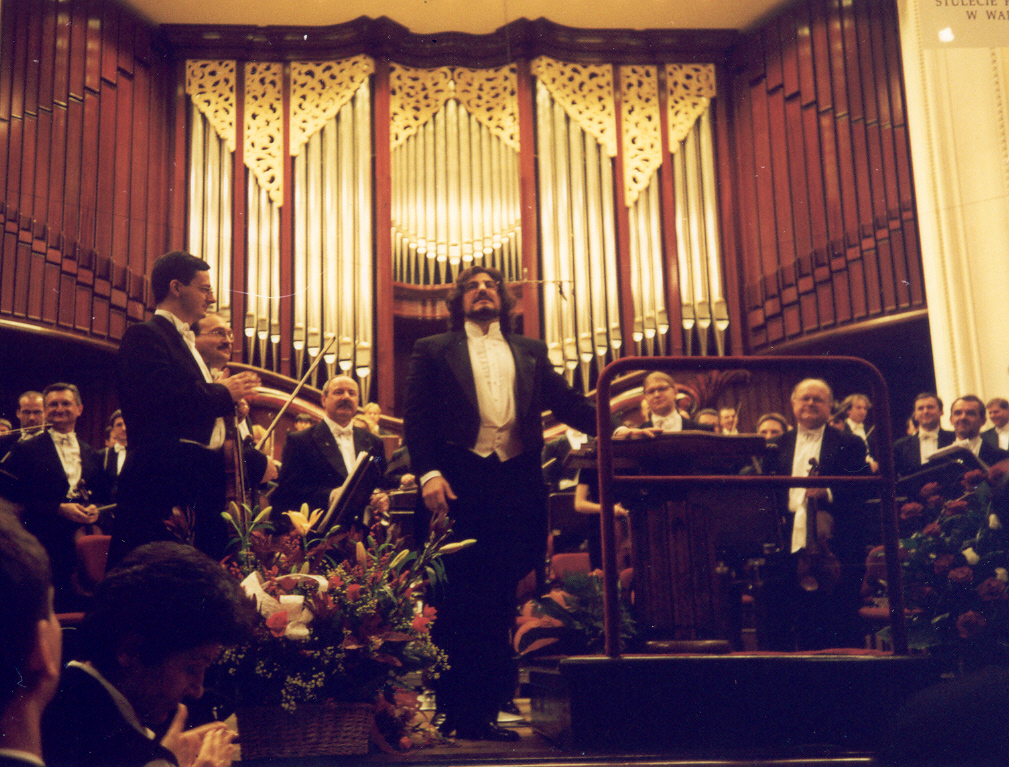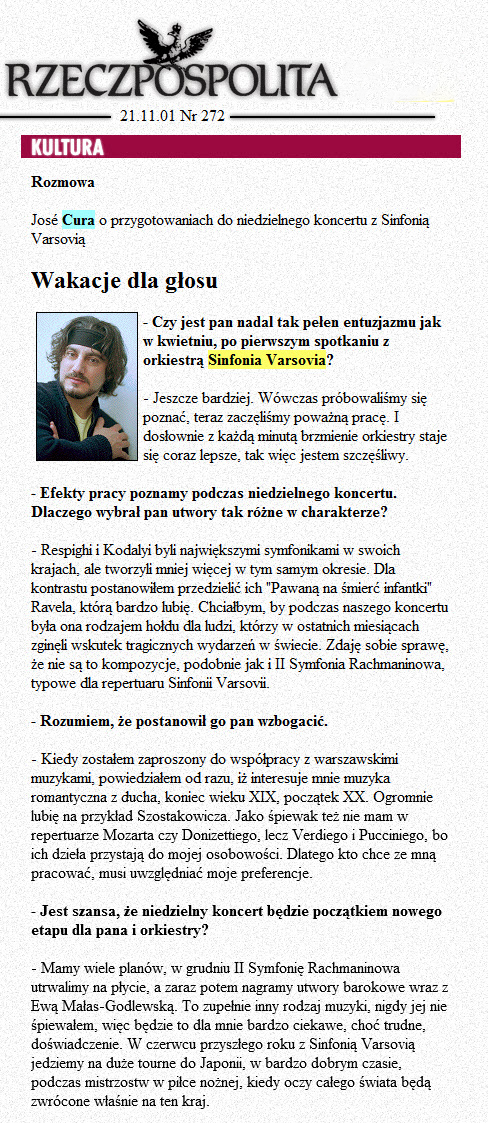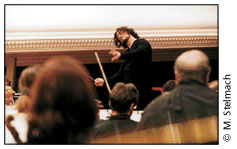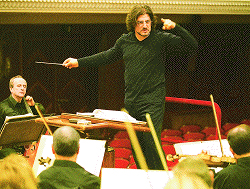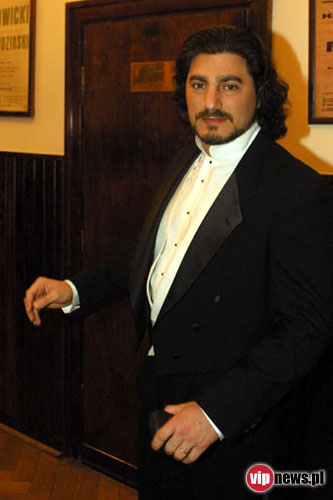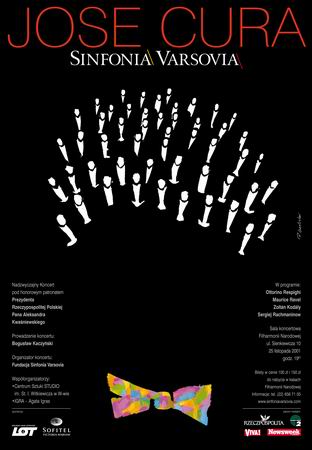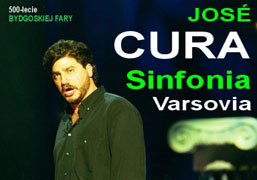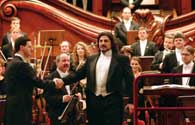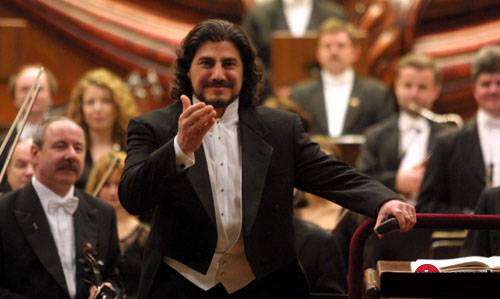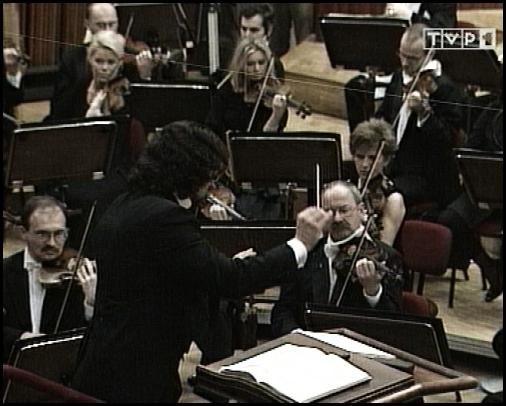2001 - Warsaw
First Concert with Sinfonia Varsovia
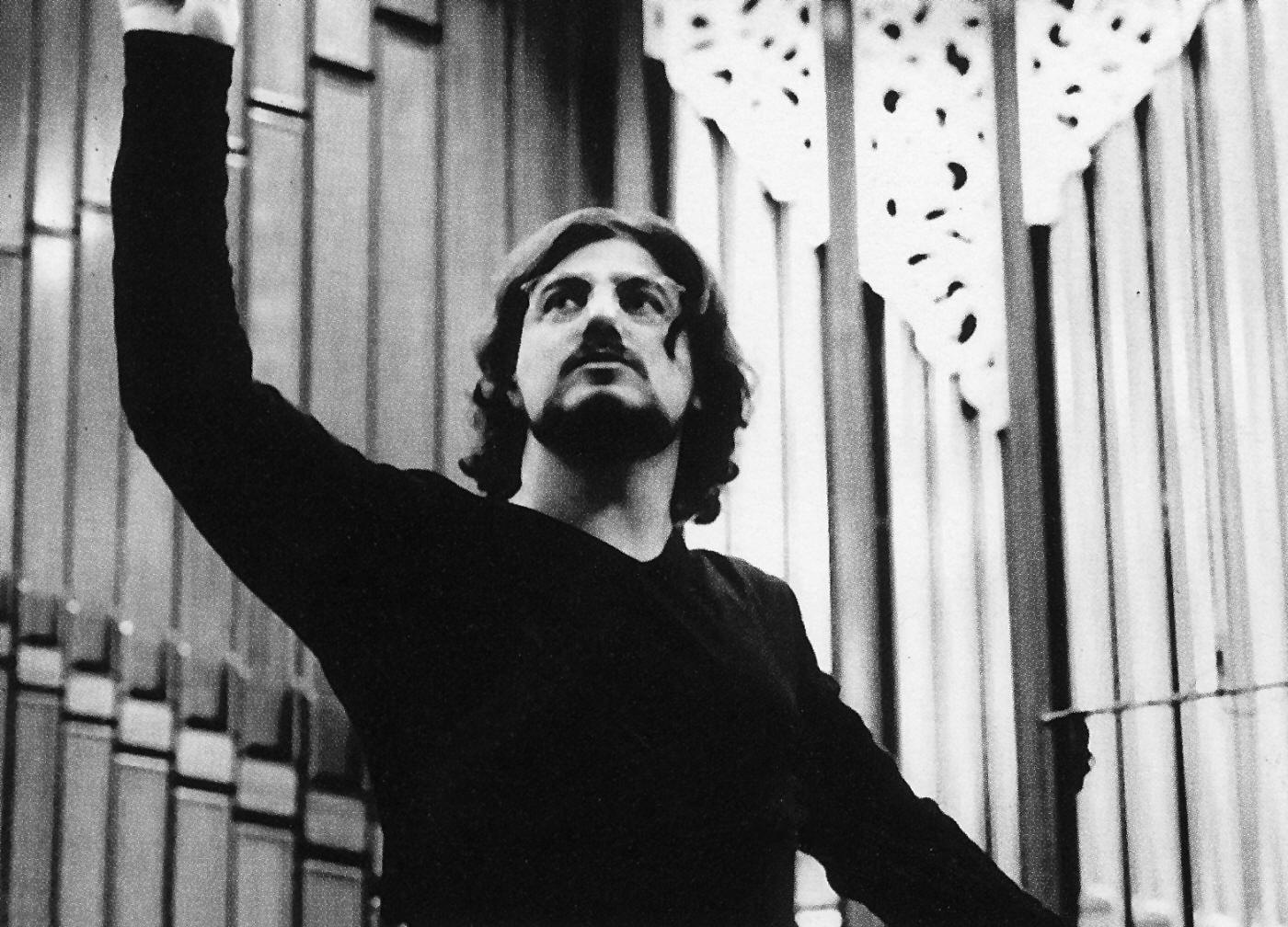
|
|
|
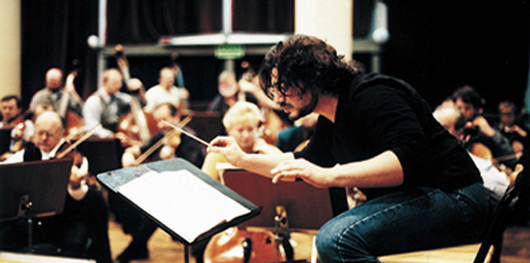
|
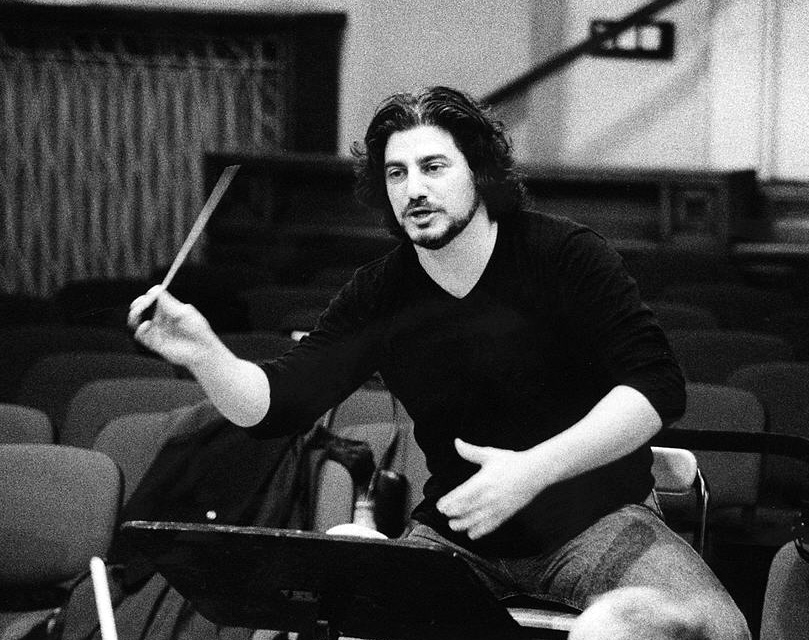 |
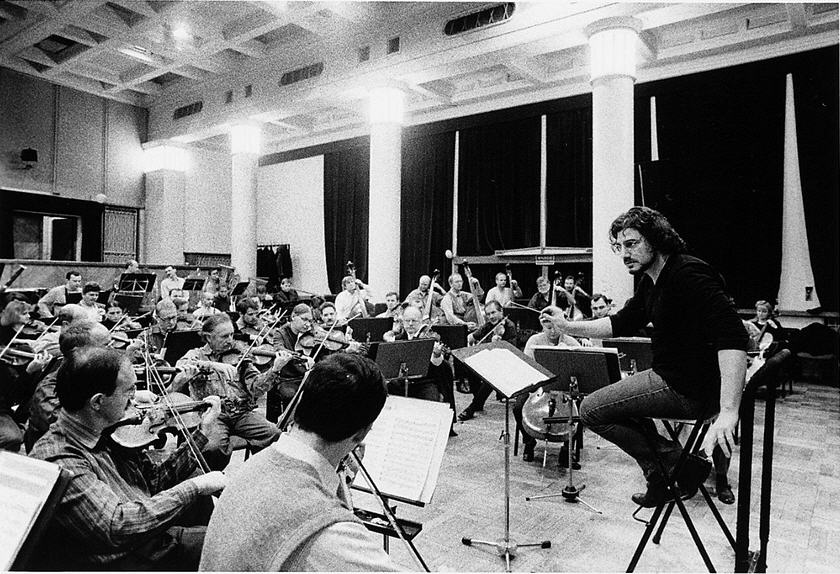
|
|
|
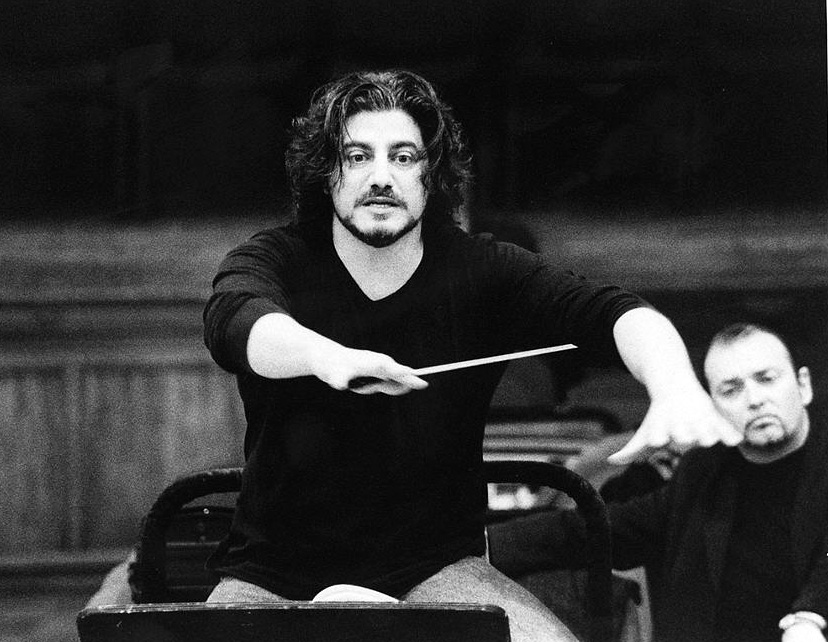
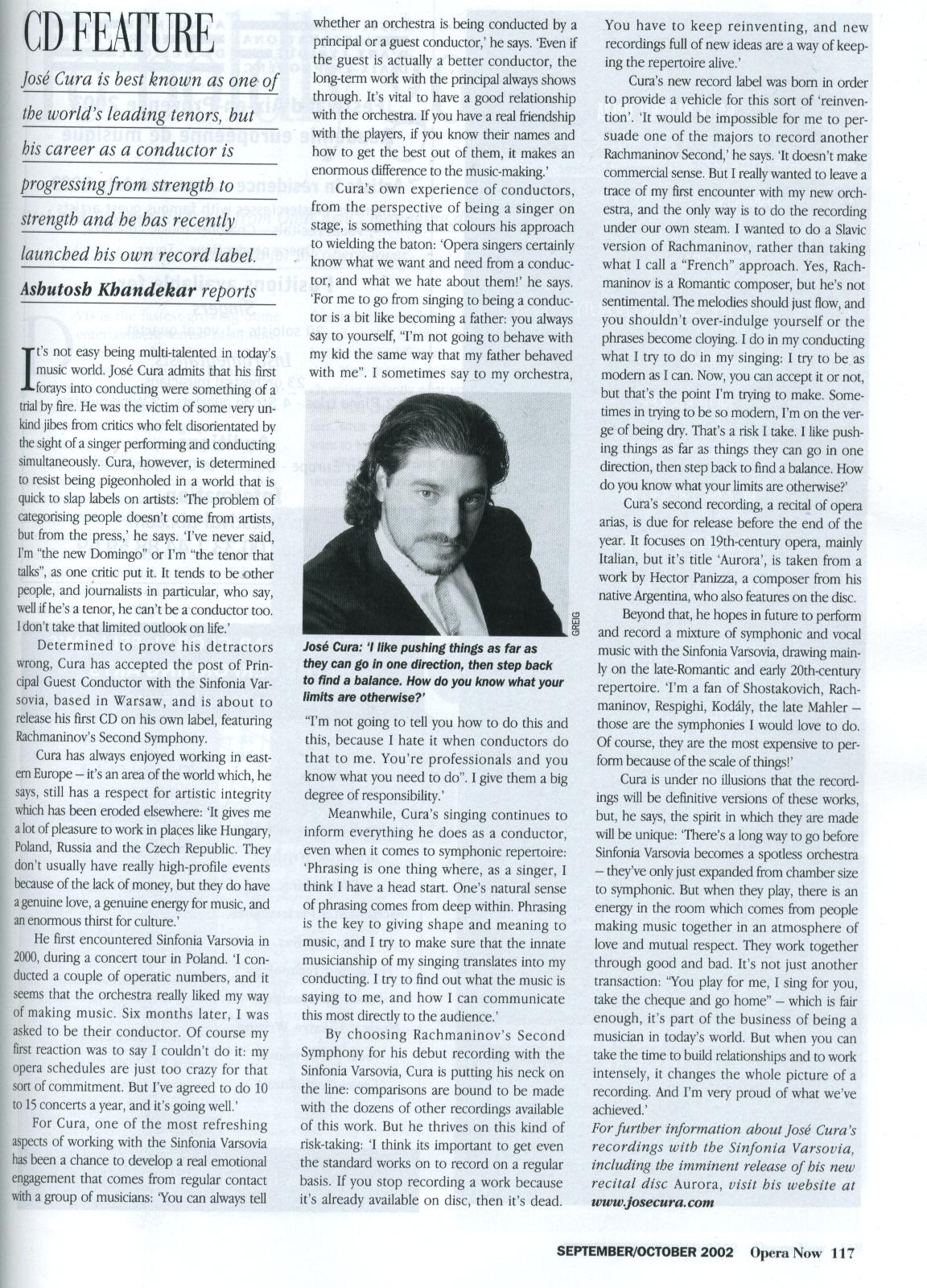
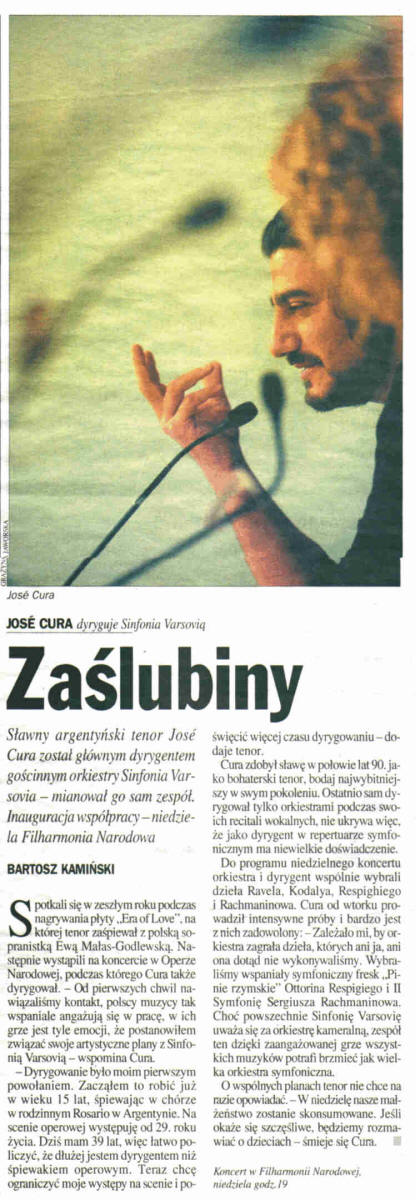 |
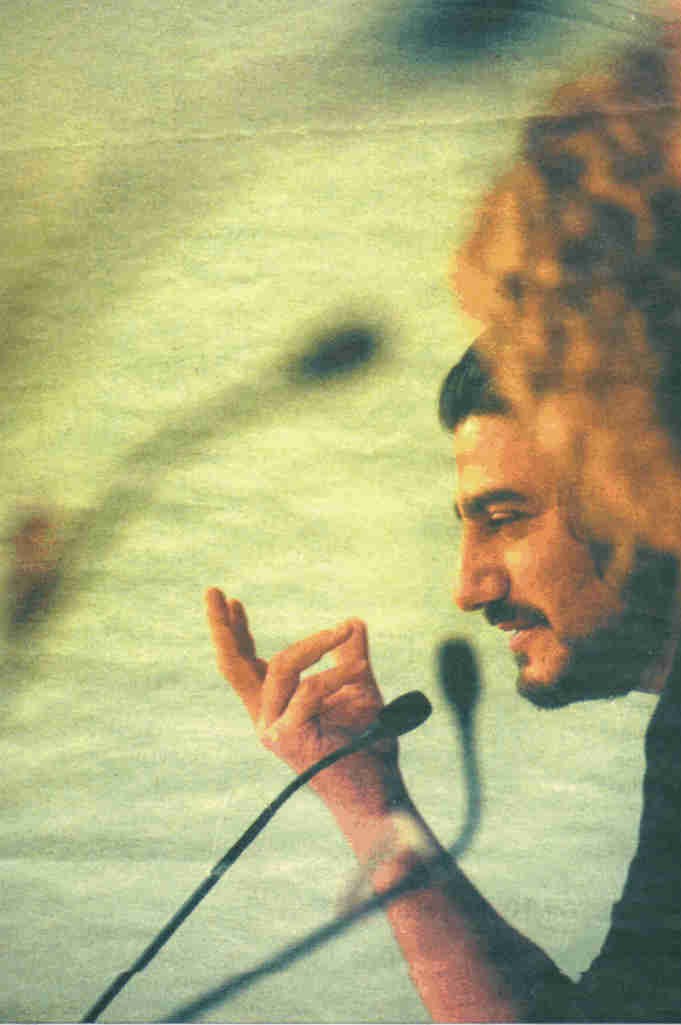 |
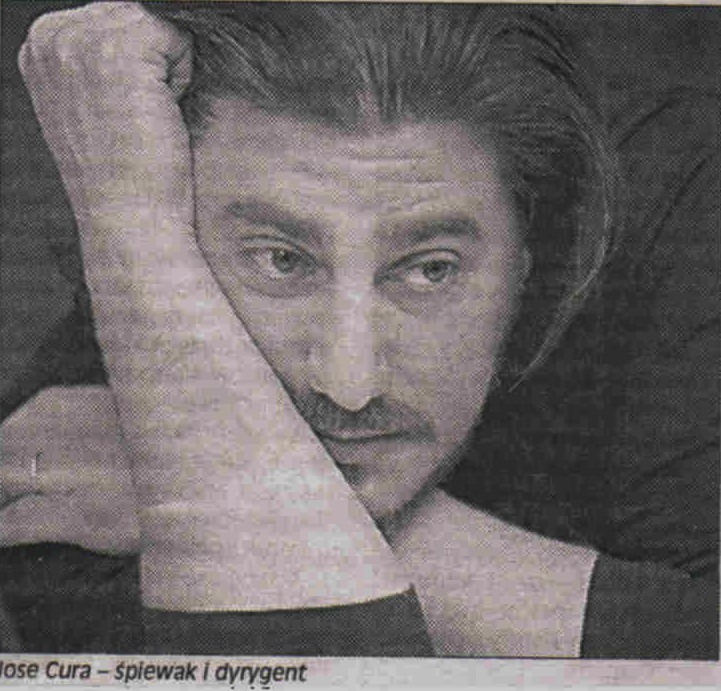
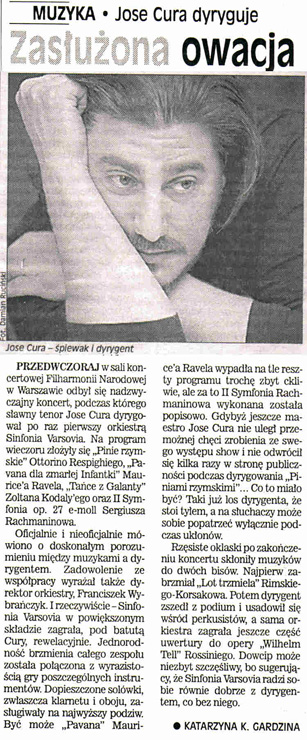
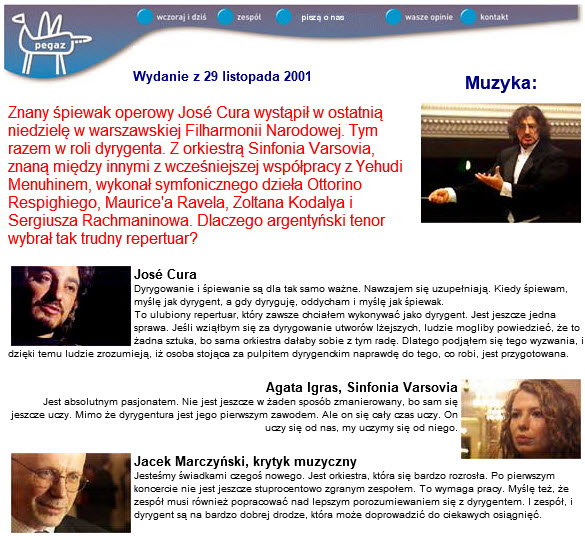 |
|
|
|
|
||
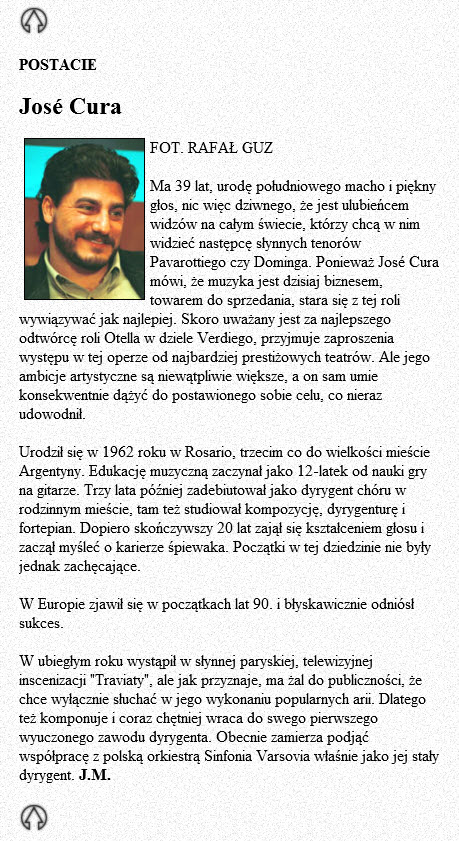 |
|
|
|
|
||
|
|
|
|
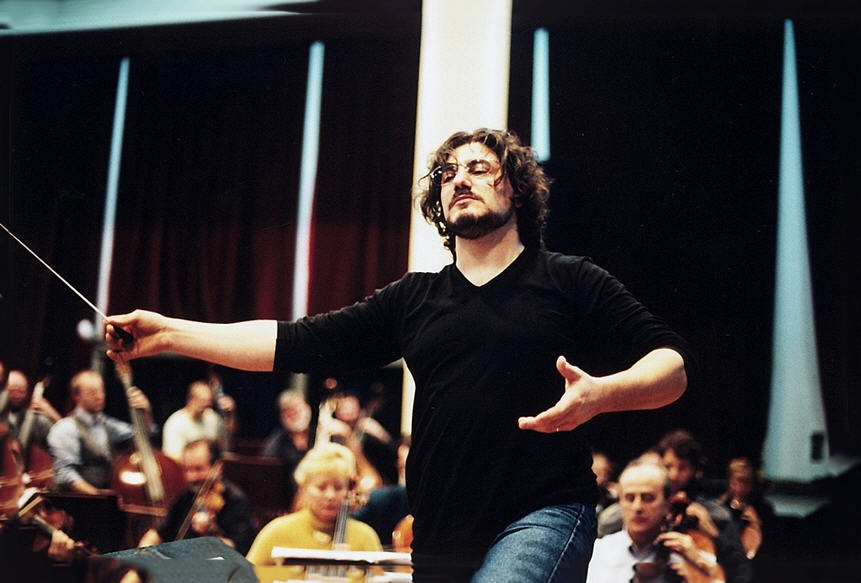
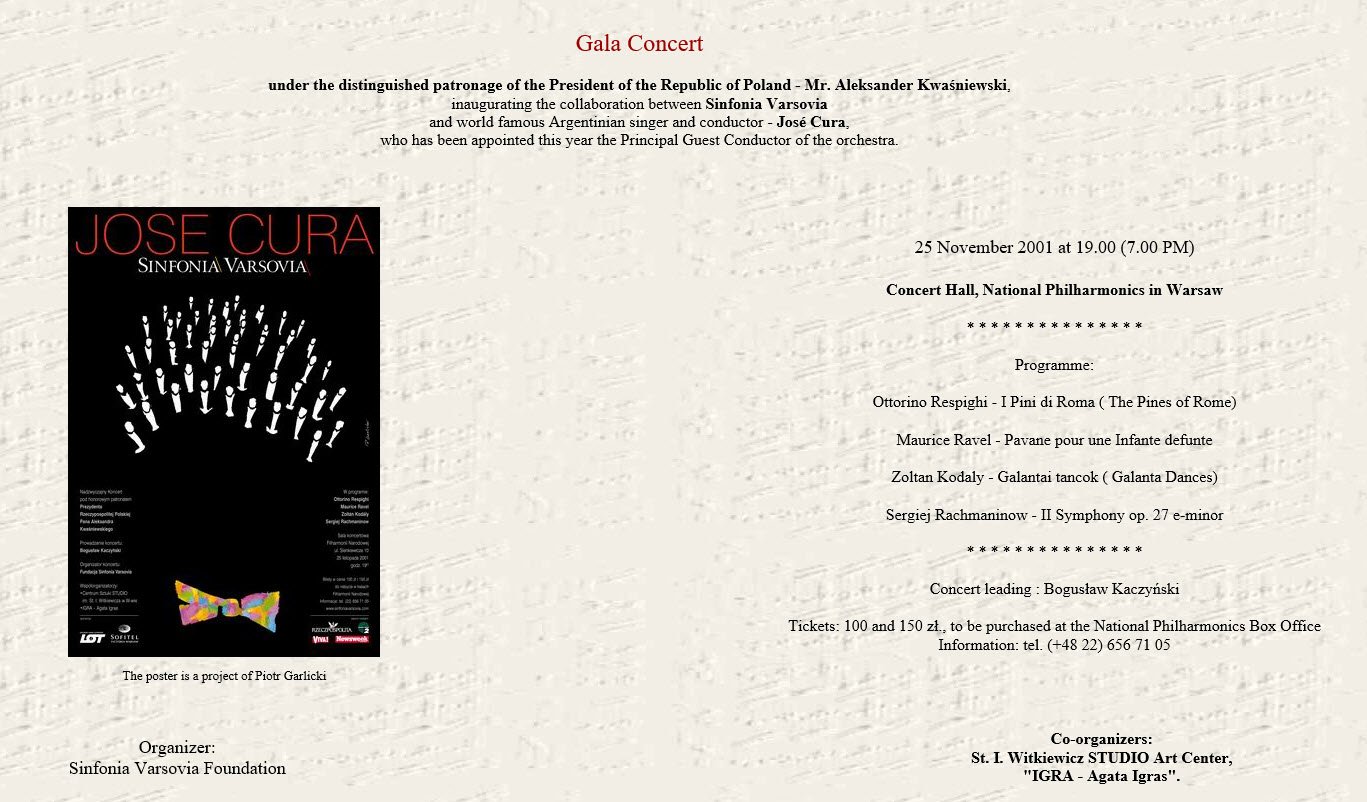
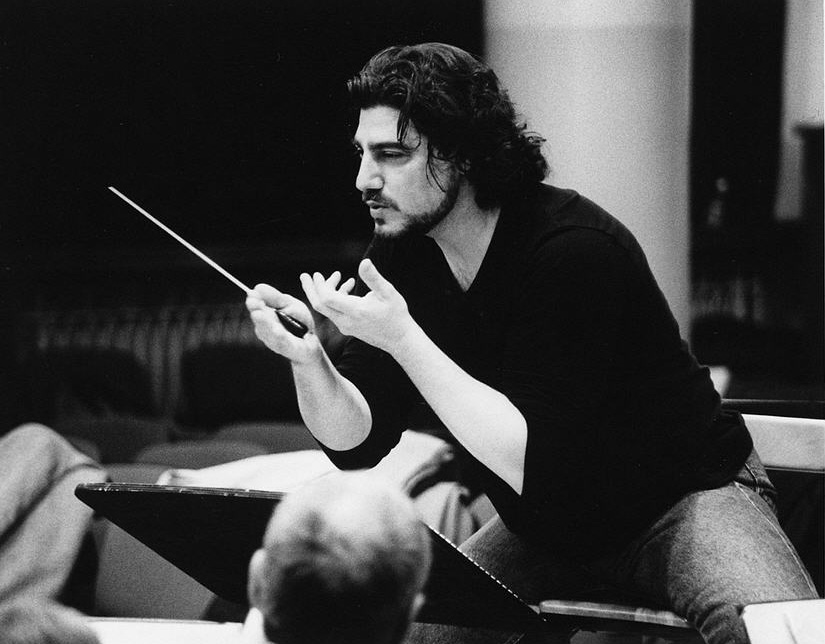
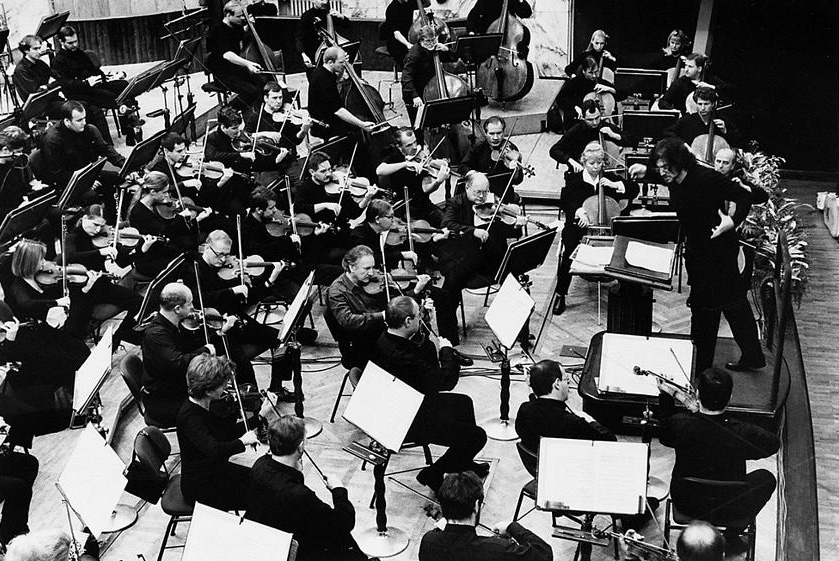
|
Note: This is a machine-based translation. We offer it only a a general guide but it should not be considered definitive.
José Cura Conducts Trubadur Katarzyna K. Gardzina A report on the press conference…. On 25 November 2001, an extraordinary concert took place at the Warsaw Philharmonic concert hall, during which the famous tenor José Cura conducted the Sinfonia Varsovia in concert for the first time. […] A few days before the concert, a press conference featuring José Cura and Franciszek Wybrańczyk, director of Sinfonia Varsovia and president of the Sinfonia Varsovia Foundation (concert co-organizer) was held. Below are some of the more interesting statements from the tenor-conductor: José Cura: For several days journalists have been asking me only about the Era of Love album and concert. I understand the interest of the media but please remember that in my music life a project like Era of Love is only a part… It is thanks to that project that I am here today. I met Sinfonia Varsovia for the first time during that concert. -- Where did you get the idea to conduct? JC: I started conducting when I was 15 and I started singing [professionally] when I was 29, so conducting came first. -- Have either you or the orchestra previously performed the pieces included in this concert? JC: I haven’t conducted this program before. I wanted my first concert with this orchestra to be something completely new for me and for them. Thanks to this, we have the chance to create completely pristine music together. -- Do you have any further repertoire plans related to the orchestra? JC: I hope to marry an orchestra on Sunday. Who or what our children will be we will decide once our marriage is concluded. […] This is just not another concert because for us it is the hope of a wonderful future together. It will be like a wedding and sometimes I would like people to throw rice rather than applause at the end of the concert. For now there are two projects: on 3 and 4 December of this year we will record Rachmaninov’s Symphony No 2. In June 2002 we will offer ten concerts in Japan during the World Cup there. It is known that on such occasions that the eyes of the entire world will be directed there. -- When will you present yourself as a composer? JC: I don’t know when I will have the courage to present my compositions, because the presentation of my own songs is something that is terrifying (…) I remember singing in the Teatro Colón in the 1984 / 1985 season. There, for the first time, I met Krzysztof Penderecki, who came with the premiere of his Te Deum. Life is fun and surprising—now I am the main guest conductor of the orchestra whose musical director is Penderecki. So imagine how proud that child who is hidden away inside of me is to work with such a legend. -- When will you perform in Poland as a singer? JC: At the moment I have no plans to sing in Poland because no one has invited me, but if you know someone like that, I am waiting for proposals. For now, you’ll be able to see me more often in Poland as a conductor, perhaps singing with his orchestra. -- Returning to the future repertoire of the orchestra, maybe you can share some secrets? JC: The repertoire plans I have for the orchestra are tied to the period that interests me most, that is the music at the turn of the 19th century and the 20th centure. I identify with this music the most. As for specifics, think of the symphonies of Shostakovich or Holst’s Planets. --What percentage of Polish music will be included in the repertoire? JC: One of the Polish numbers I would like to conduct, and which I personally identify with, is Górecki's Symphony No. 3. I have already asked a soprano to learn the part, so maybe. You can also imagine a concert in which in the first part I would conduct Górecki's symphony and in the second Penderecki would conduct his Requiem with me singing Lacrimosa (…) because, as you know, it’s written for tenor but no tenor has yet performed it. Oh, that’s a great idea. I hadn’t thought about it before… I would also like to make sure that this orchestra finally has its own space, a home. It should also have a normal concert season, with 10 – 15 concerts in its own country.
|
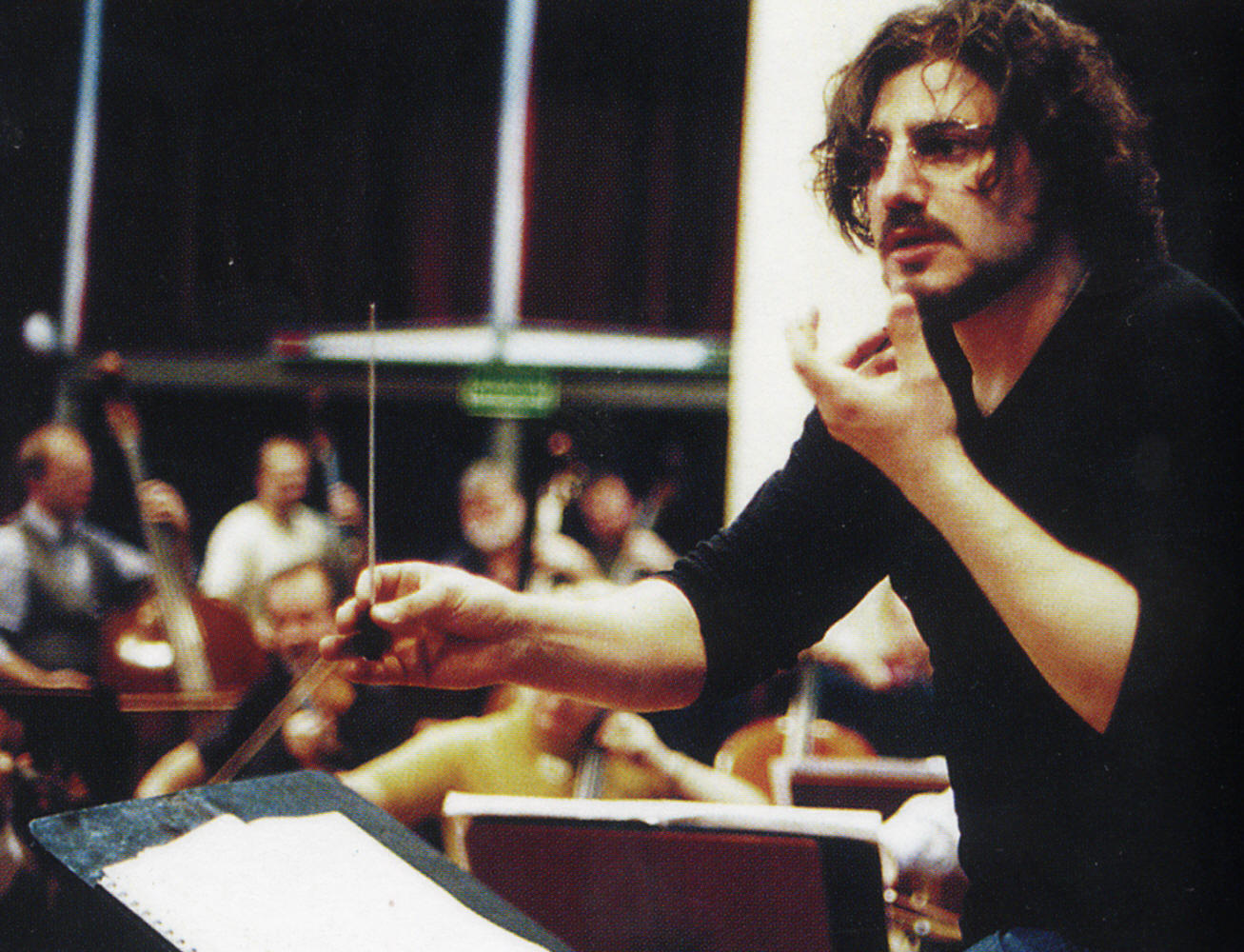
|
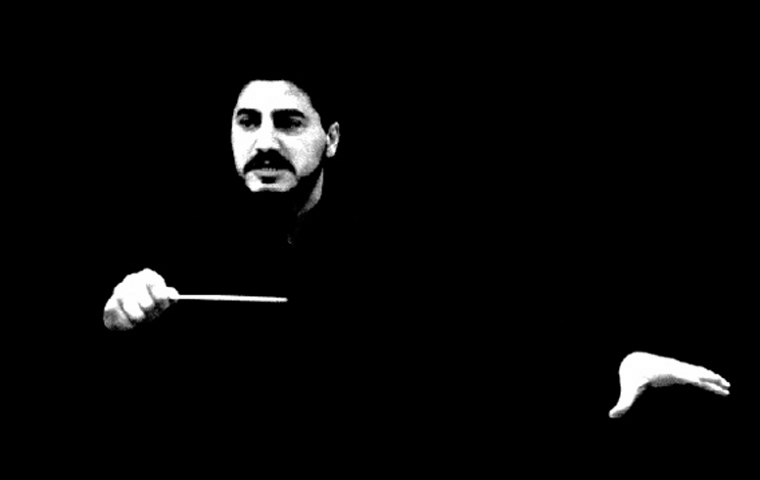
|
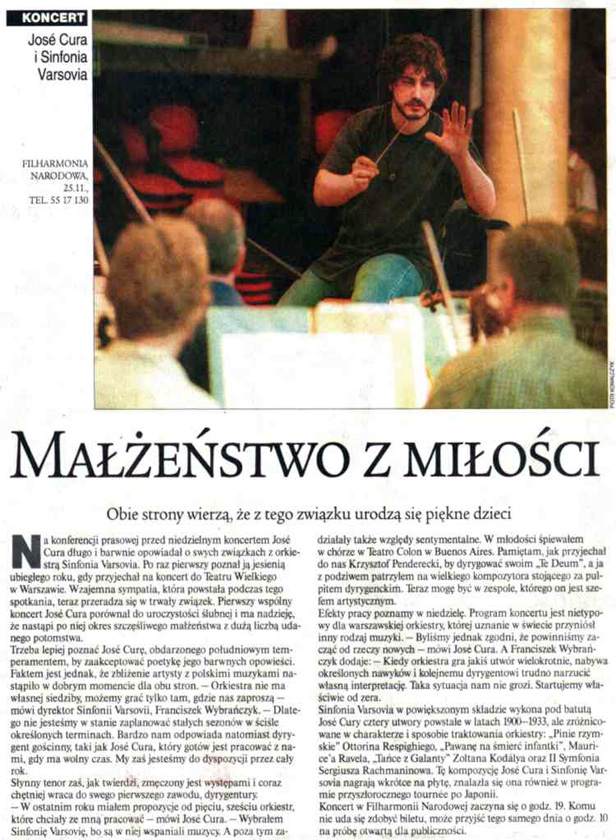 |
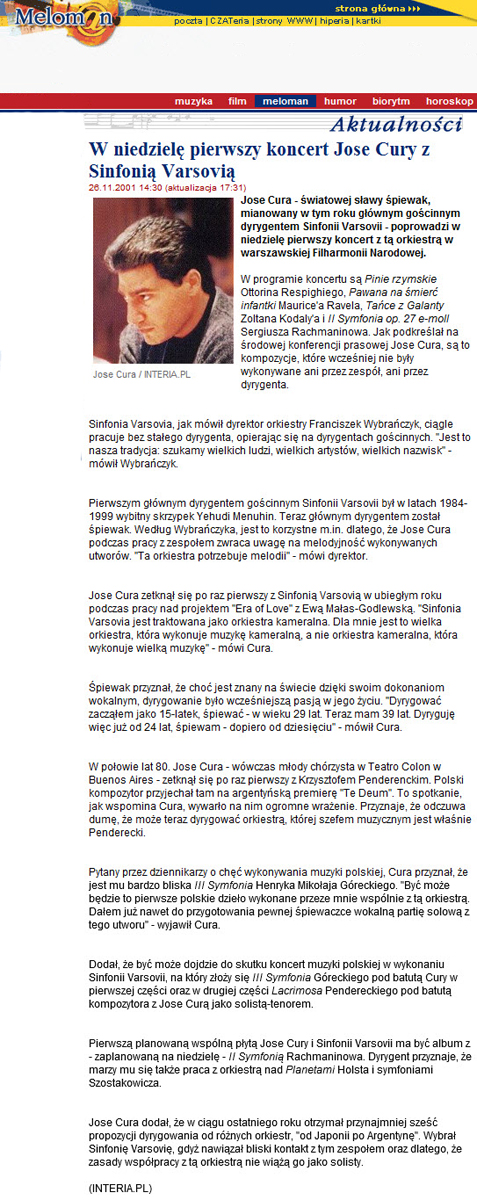 |
|
|
|
|
|
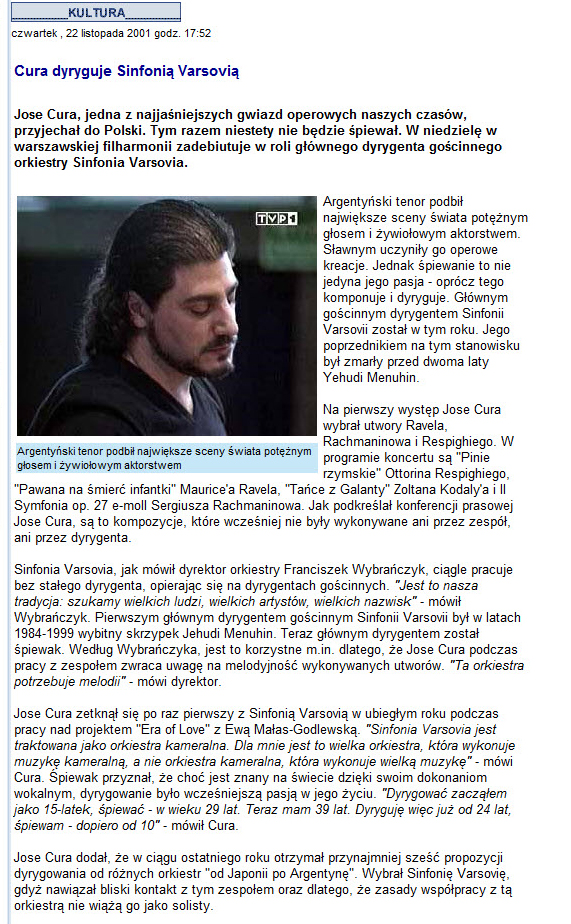 |
|
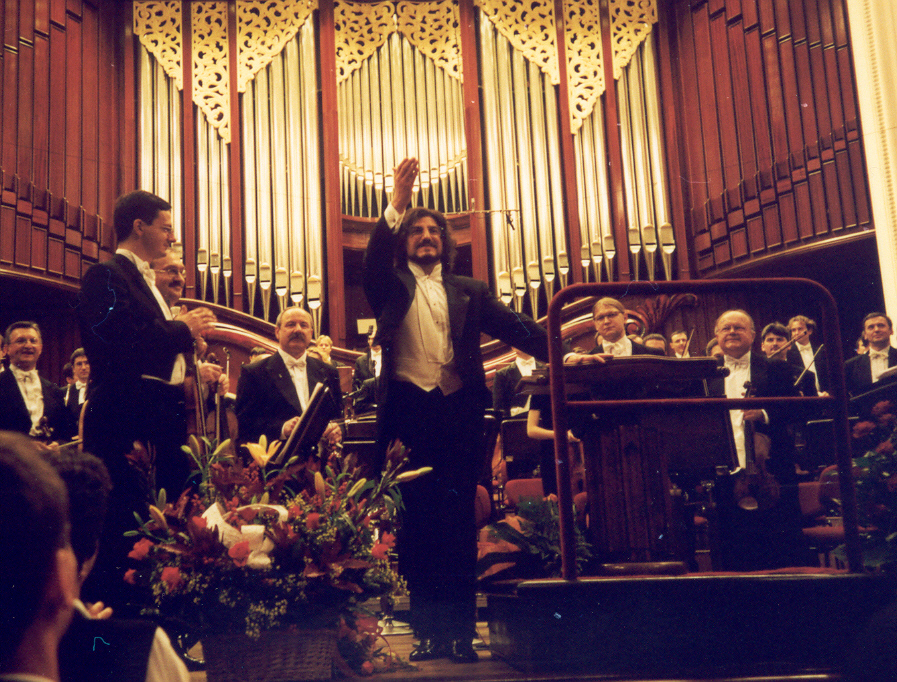
|
Note: This is a machine-based translation. We offer it only a a general guide but it should not be considered definitive.
Extraordinary Concert
NET Promotion 2001-11-26 José Cura – who doesn’t know the name? An outstanding singer, composer and conductor, last year, together with Ewa Małas-Godlewska, he recorded the album Era of Love, which gained enormous popularity in our country. On Sunday evening, this acclaimed artist took part in a concert held in Warsaw’s National Philharmonic. During this “extraordinary concert” Cura appeared as a conductor, with Sinfonia Varsovia performing the most beautiful themes from Ravel, Kodaly and Rachmaninoff. Among those in the audience were Ewa Małas-Godlewska, Jolanta Kwaśniewska, Krzysztof Penderecki and Andrzej Wajda. Bogusław Kaczyński was the host of the event. “Everyone is surprised by this, that I am conducting such an important concert. I understand the surprise—when a world-famous singer begins to conduct, it means that he does it for one of two reasons: he knows exactly what he wants or it is a suicide [mission]. I know what I want! I “married” this orchestra and I think it is a successful marriage,” José Cura stated. We should add that José Cura has been happily married for 17 years and is the father of three children. As he says, the most important moment in his life was when he stood at the alter. What are his plans for the future? During the World Cup he intends to tour Japan with Sinfonia Varsovia. In addition, there will soon be a Rachmaninov album performed by the Warsaw orchestra on the market—of course under Cura’s baton.
|
|
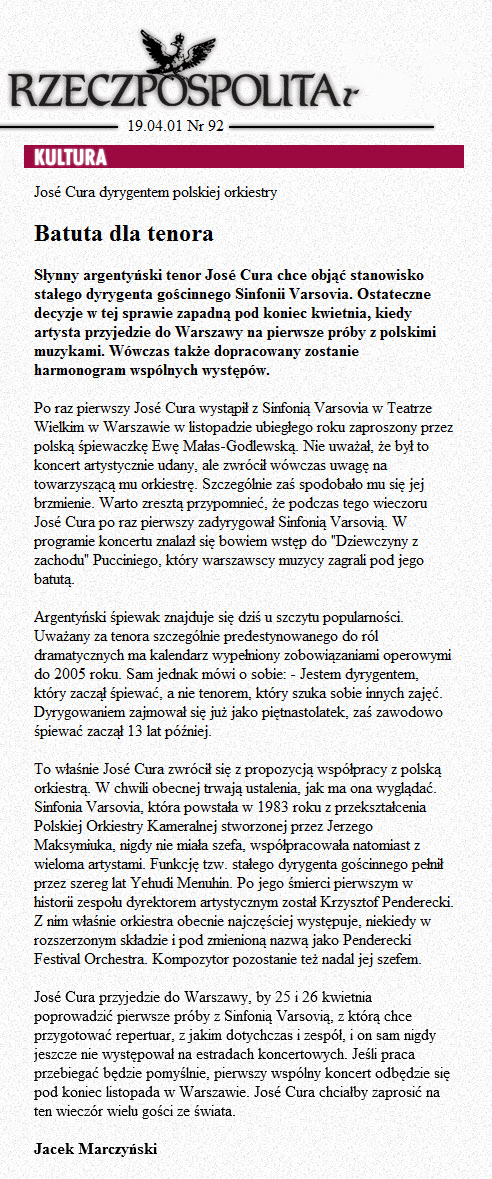 |
|
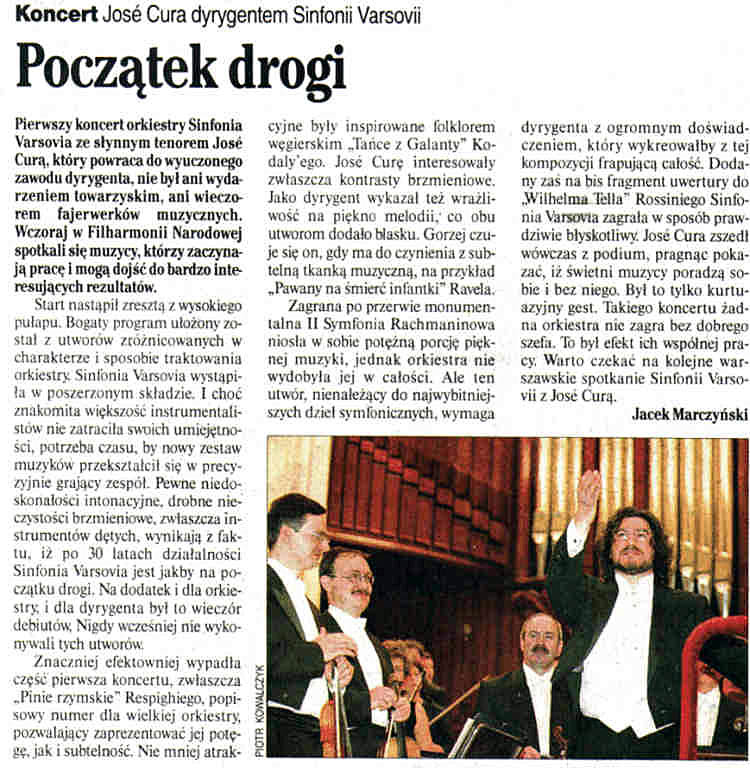 |
|
|
Note: This is a machine-based translation. We offer it only a a general guide but it should not be considered definitive.
Famous Tenor as Conductor of Warsaw Orchestra Welcome to Warsaw The distinguished world famous, opera singer Argentinean Jose Cura has become guest conductor of the famous Warsaw symphony orchestra, Simfonia Varsovia. The artist came into contact with this superb musical ensemble for the first time in September 2000, when he came to give a concert in Warsaw's Great Theatre. The reciprocated appreciation, which was born at that time between him and the Polish musicians, bore fruit in a decision to work together permanently. Jose Cura compared their first joint concert jokingly to a marriage ceremony and he hopes that it will be followed a period of happy married life with a great many talented offspring. Both sides are really pleased with this artistic connection. For the Warsaw orchestra, working with the distinguished tenor surely is creative and for him it is an occasion to return to his first profession - that of conductor. "In recent years I have had proposals from a few orchestras which wanted to work with me. I chose the Simfonia Varsovia because there are splendid musicians in it. Apart from that, I decided from a sentimental point of view. In my youth I sang in a choir in Buenos Aires. I remember how the eminent Polish composer Krzysztof Penderecki came to us to direct his "Te Deum" and I observed him with admiration. Now I can work with an ensemble of which he is the artistic leader," Cura confided to reporters. At the inauguration of this co-operation, Simfonia Varsovia, conducted by Jose Cura, performed a few works of European music, composed during the years 1900-1933, among them:"Pavane pour une infante defunte" by M. Ravel. The audience gave the artists a warm ovation.
|
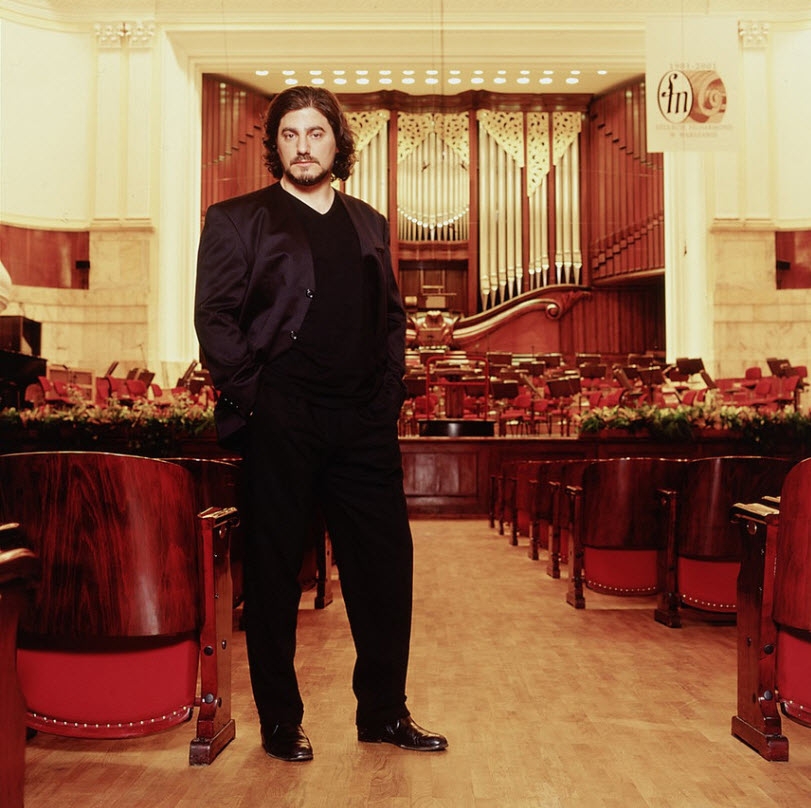
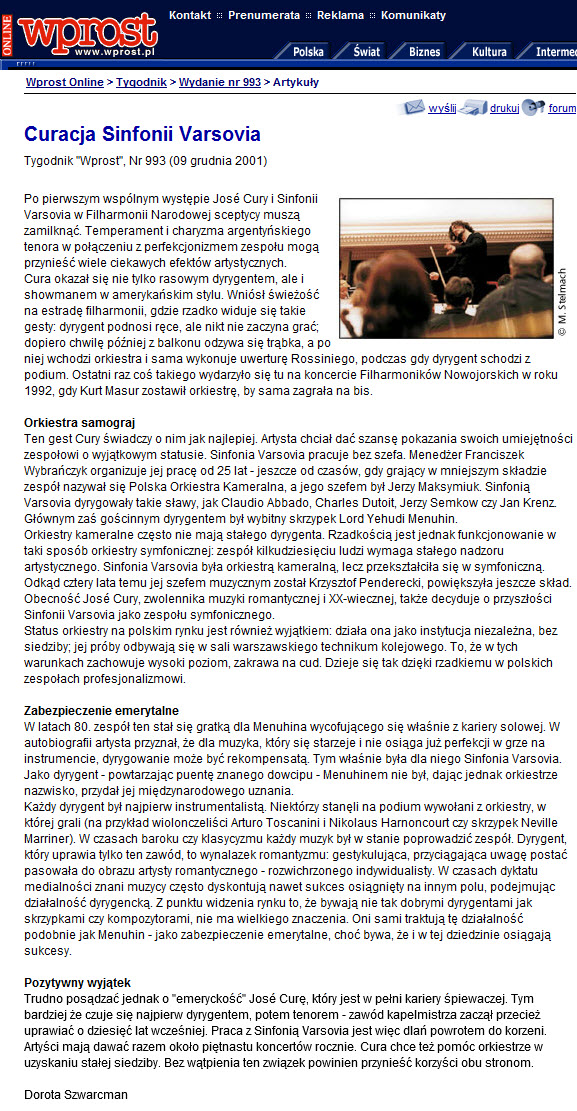 |
|
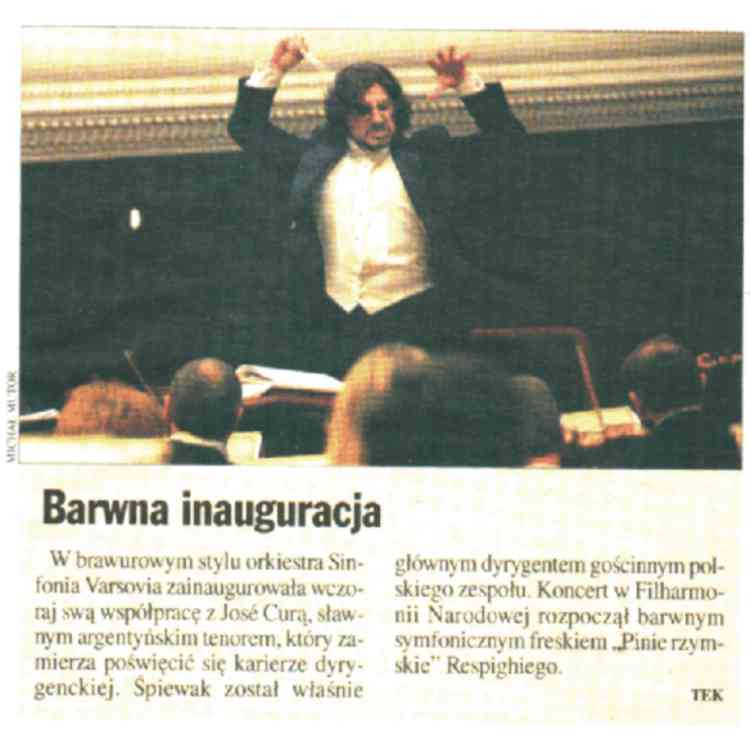
|
Polish Press Reviews of José Cura's
1st concert as the Principal Guest Conductor of Sinfonia Varsovia at
the Concert Hall of the Philharmonic, Warsaw Rachmaninov Symphony No, 2 in E minor
Sinfonia Varsovia's artistic director for the past 4 years is Krzysztof Penderecki. He has now gained another great name with whom to collaborate. José Cura, until now, has been more known as a vocalist than a conductor. Originally he studied conducting and composition in home Rosario and then in Buenos Aires. After becoming famous as one of the most eminent tenors of his generation, he now returns to conducting. It was an impressive start, with large media coverage. One could find all the main politicians in the audience and the President of the Republic of Poland has taken the concert under his distinguished patronage. Sinfonia Varsovia was born in 1984 on the basis of the legendary Polish Chamber Orchestra, established in the 70’s by Jerzy Maksymiuk. This small orchestra was elevated by the hard work of Maksymiuk and is now greatly admired by Polish and international critics. Maksymiuk stood down as Yehudi Menuhin became the Principal Guest Conductor of the ensemble which by this time had grown from a string ensemble to one with wind and brass players making it more a chamber orchestra than string ensemble. Menuhin’s great personality and his
enthusiasm with the Polish orchestra sustained the highest artistic
level.
After the concert of the Argentinean conductor and tenor
|
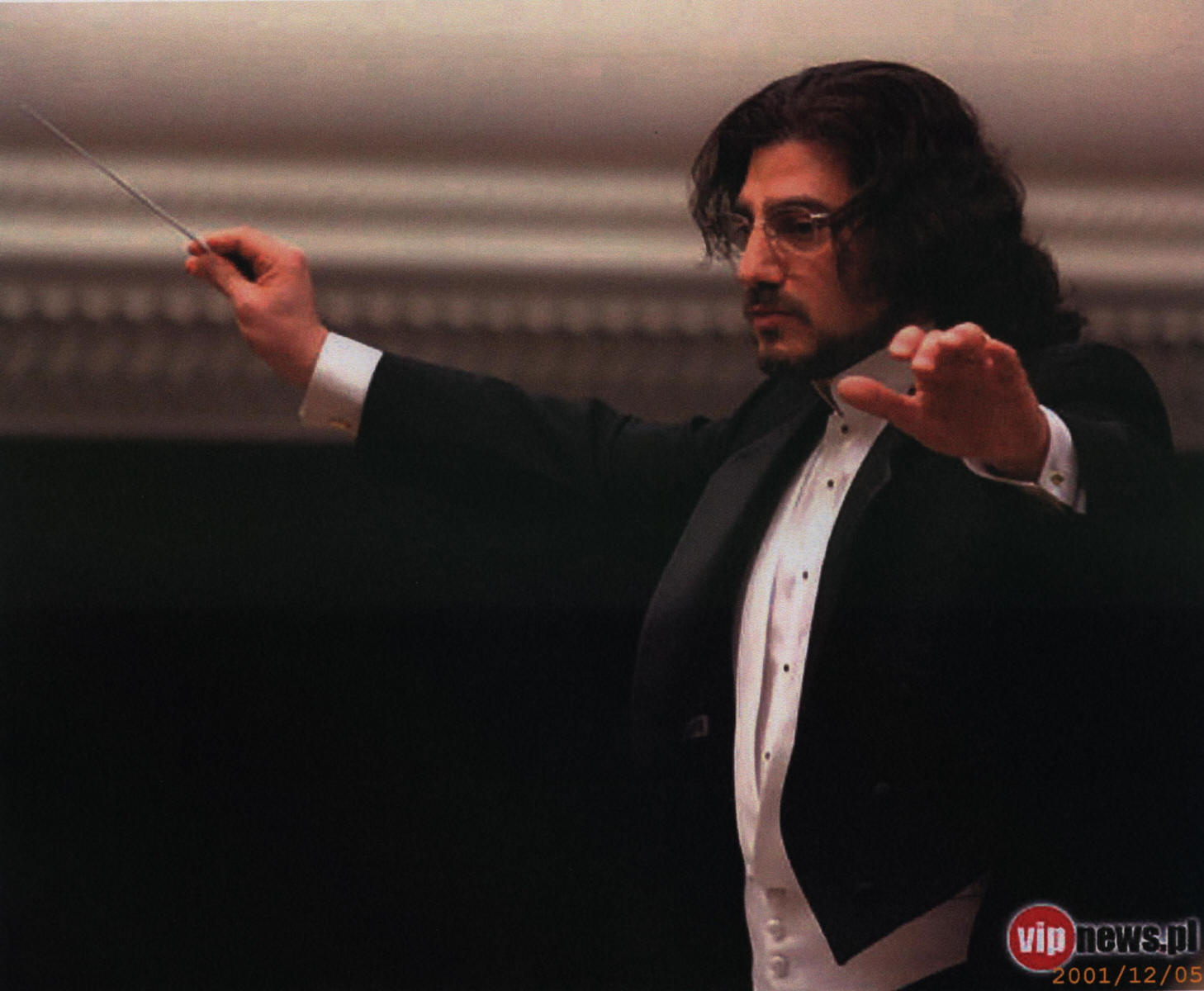
|
Note: This is a machine-based translation. We offer it only a a general guide but it should not be considered definitive.
José Cura: I'm a romantic guy Gala Zobacz Diashow Somehow I arrived a bit too early for the appointment at the railway technical school. It was cold so I decided to enter the building. When I opened the door, I realized that I was standing in the middle of the orchestra. A young man with black hair, in jeans and a sexy T-shirt looked at me in surprise, smiled and continued to conduct. It was José Cura, one of the most famous tenors. A moment later, we sat in a small office that looked nothing like the wardrobe of the star of the largest operas in the world. José Cura did not complain. During the conversation I became convinced that he was the tenor of the 21st century and the sexiest opera lover. In addition, a loving father and husband. I love you, Mr. Cura. Gala: What is it about the Sinfonia Varsovia orchestra that you prefer to conduct it rather than sing with it? José Cura: I sing for money, I conduct because I love to do it. And the Polish orchestra is one of the greatest I've ever heard. They are technically great and have passion. Slavic energy. I have conducted orchestras around the world. The English are perfect but their music lacks soul. The Italians are fiery, but not very disciplined. In the Polish band, every musician has a great personality, but at the same time they are disciplined and technically well prepared. It is not easy to manage a group of such individuals, but it is a great challenge. Gala: For several years, the orchestra's conductor was Yehudi Menuhin. Will it be difficult to lead a symphony orchestra after such a great conductor as Lord Menuhin? José Cura: I do not intend to compete with a man who was already a legend in his lifetime. That would be foolish. Yehudi will be one of the most important artists of all time. I want to continue working with the Sinfonia Varsovia orchestra from the place where Yehudi ended it. Gala: Will your name help promote Sinfonia Varsovia? José Cura: The Sinfonia is better known in the world than it is in Poland. It needs to be promoted in its own country. It is a scandal that such an excellent orchestra has no rehearsal room and so must get accommodations by renting space from the railway school. Gala: You are the only one in the world who has simultaneously conducted and sang several times. As far as I know, no one repeated this feat? José Cura: I happen to conduct and sing throughout entire concerts. It is a killer job. After the show I couldn't even sleep. Gala: Why don't you like to compare with three famous tenors: Pavarotti, Domingo and Carreras. Is this the wrong company? José Cura: You provoke me. I can't be seen the same as they do. First of all, I belong to a different generation. They are artists of my father’s age. I have been singing for only several years, they have sung for 30. They had time to become legends. Gala: Do you find free time for your family life? After all, your wife and three children are waiting at your home in Madrid. José Cura: I'll be returning soon. I have only just arrived in Poland. It would be more reasonable to stay here longer and sleep a few nights at the hotel. However, I gladly go back home to feel the moments as a father and husband. I miss my family. So sometimes my wife joins me. Now she also came to Poland. Gala: I know that your professional calendar has dates to 2006. Doesn't your wife object to your working that much? José Cura: She comes to most of my performances. I think of my loved ones all the time. I always send my wife flowers, even when I am far away. When I found a beautiful variety of orchids, my wife got them the next day. That's how I was programmed - I'm a romantic guy.
|
